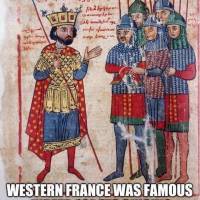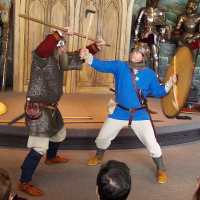In the 13th century Middle High German epic Das Nibelungenlied, a little name calling escalates into the death of our hero Sifried (Sigurd from the Volsung lengend). That almost happened in Better Call Saul a few weeks ago when two skateboarders unwittingly attempted to con Tuco’s grandmother.
When Tuco discovers this, he hogties the skateboarders and takes them out to the desert to execute them. Saul Goodman – who at this point in the story is still known as Jimmy McGill – provides legal defense for the skateboarders in an adhoc desert courtroom where the judge is a psychotic drug kingpin and the jury is comprised of the kingpin’s goons.
Though he seems willing to drop charges on the con, there is another offense that Tuco is not willing to forget: the two offenders called his grandmother a “Biznatch.” He seeks the death penalty for this one.
Smoothing Tuco over with lines like, “You’re tough – but you’re fair – You’re all about justice,” Saul eventually barters the punishment down from death to a broken leg. In the end, everyone feels the punishment fits the crime.

Jimmy McGill aka Saul Goodman (Bob Odenkirk) and Tuco (Raymond Cruz) negotiate in Better Call Saul. image copyright 2015 AMC, High Bridge Productions, Sony Pictures Television
Unfortunately for Sifried, Saul Goodman wasn’t around to counsel King Gunter when his wife Brunhild demanded justice after Sifried’s wife Krimhild called her a whore. Instead of Saul, Gunter had Hagen of Troneg who convinced his king that Sifried’s death was the only penalty that fit the crime.
It all started when Brunhild quarreled with Krimhild for daring to walk into church before her, “No maid in waiting is allowed to walk in front of a great king’s very own lady.”[1]
Krimhild doesn’t let this insult go without a comeback:
Krimhild quickly answered (easily as angry):
“You’d be better much off holding your tongue. Your shame
Is selling your beautiful body to acquire a lady’s name.
How can a whore transform herself a queen, when she’s been so shamed?[2]
(this odd spacing is intentional and is explained at the end of the post)
For those unfamiliar with the story, here’s why Krimhild said such a thing to Brunhild:
King Gunter isn’t the fittest man, but he set his eyes on the Icelandic queen Brunhild. To marry Brunhild you had to beat her in several physical challenges – boulder throwing, spear-throwing, stuff like that. If you lose, you die – but if you win, you get to marry Brunhild. There was no way King Gunter could defeat Brunhild in the games so, wearing a cloak of invisibility, Sifried helps Gunter defeat Brunhild. I wrote about this episode in a previous post.
Gunter gets to marry Brunhild, but as you can imagine she quickly realizes that he’s not the gladiator he seemed during the games. On their wedding night, Brunhild refuses sex and instead ties Gunter up and makes him spend the night hanging from the ceiling.
The next day when Sifried asks Gunter how his first night in the sack with Brunhild was, the humiliated king asks Sifried for his help. Sifried appears the second night – and with that cloak of invisibility – breaks Brunhild like a wild horse. Once she yields to him, he takes her belt and ring and lets King Gunter take over.
The belt was a magic belt of Nineveh silk. It was the source of Brunhild’s superhuman strength. And as for the red golden ring- could it be the cursed ring of Fafinir’s horde?
Brunhild looks at Krimhild and realizes she’s telling the truth:
“She’s wearing, now, the silken belt I lost, and my red-
Gold ring is on her finger. I’d wish I’d never been born,
My king, and live eternally sorry, unless you restore
My honor, free me from this utterly gross and ghastly slander.”[3]
King Gunter summons Sifried to tell his side of the story. Sifried tells Gunter that he never boasted to anyone that he had Brunhild’s body before the king had slept with her. Gunter frees Sifried of all charges. Just before leaving, Sifried adds:
“Men should make certain,” heroic Sifried went on,
“that women’s tongues are checked, kept from wagging loose.
You control your wife, and will try my best to make sure
Of mine. I’m thoroughly ashamed of such disgraceful behavior.”[5]
Seeing Brunhild unsatisfied with Gunter’s resolution, Hagen of Troneg convinces King Gunter that the only way to resolve this problem is to kill Sifried:
The king listened to evil Hagen, his trusted man
Burgundy’s faithless knights set to work
Worthy warriors preparing hidden betrayal and death
So just two women quarreled but many heroes would breathe their last.[6]
And so Sifried’s fate was decided just like that – he would be killed in a “hunting accident.” Justice would be served in hidden betrayal. Though King Gunter gave one verdict out in the open, the final verdict given in private was very different.
One wouldn’t expect the final judgment of a psychotic meth dealer on one of his enemies to be fairer than one decided on by a king with the help of his wise advisors, yet it is.
Both of the penalties these powerful men imposed were intended to protect the honor of a woman who was very dear to each of them. For Gunter, it was his wife Brunhild; for Tuco it was his grandmother. Their method, however, couldn’t be any more different.
After receiving their punishment of one broken leg each, the skateboarders are free to go. Tuco agreed to a penalty and stuck with it. Though he is an emotionally unstable gangster who might kill someone for much less, we are somehow confident that he will keep his word.
This is not the case for Sifried though – the king who publicly told him his charge was dropped will – minutes later – turn around and privately condemn him to death. Why is Tuco the character we can trust to be fair and just? It must have been the sleazy, yet strangely ethical lawyer – Sifried failed to call one.
——————————————————————————
A note about the spacing in Burton Raffel’s English translation/rendering: The spacing is to preserve the half-lines of the quatrains. Raffel explains, “Each line is divided, visually as well as metrically, into two half-lines. The first seven half-lines of each quatrain (that is, the first three and a half lines) have three metrical feet; the last half-line usually, but not always has, has four feet. I have followed this pattern very closely.”[7] He also notes that the quatrains in Das Nibelungenlied are not always end-stopped. Using the quatrain above (Raffel’s 876 – the final quatrain of Adventure 14) let’s look at manuscript C of Nibelungenlied.
detail of Das Nibelungenlied quatrain 876 from manuscript C. image source
Notice the marks indicating the half-lines. In this quatrain they appear after übel, man, untriuwe, an, erfünde, erkorn, bâgen, and verlorn.
To see them a little easier, first look at the transcribed version below. An early 20th century editor[8] preserved the half-lines of the quatrain in his transcription.
The half-lines can look a little odd in Modern English translation in instances where the idea conveyed doesn’t seem to naturally elicit a pause. There’s a strange intoxicating rhythm to the poetry though. Try reading it aloud – but not just one quatrain, otherwise it won’t work – it should be an entire scene – or better yet, a full adventure. I can’t quite describe it – but reading it aloud like that somehow brings you deeper into the poem. Strange to say, but it’s enchanting. These half-lines are not exclusive to narrative poetry in Middle High German. They are used in Saxon poetry and Old Norse poetry as well. Popular examples are Beowulf and the Elder Edda.
[1] Raffel, p. 117, quatrain 838.
[2] Raffel, p.117, quatrain 839.
[3] Raffel, p. 119, quatrain 854.
[5] Raffel, p. 120-1, quatrain 862.
[6] Raffel, p. 122, quatrain 876.
[7] Raffel, p. 333.
[8] Das Niebelungenlied, ed. Friedrich Zarncke (Niemeyer, 1905) available online.
edit: 11/11/2016. Removed Spoiler alert for Season 1, ep.2 of Better Call Saul from the top of the post.
edit: 11/7/2019. Removed footnote 4 as it may be offensive to some in the audience when taken out of context.



















